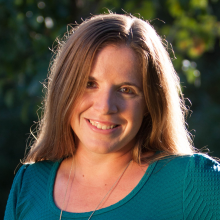March 2015 Spotlight on the SRCD Policy Fellow: Beth Meloy, Ph.D.
2014-2015 Federal Executive Branch Policy Fellow
Prior to becoming an SRCD Fellow, I received my PhD in child development from Georgetown University as well as a Master’s in Public Policy from what is now the McCourt School of Public Policy. I am currently in my third year of the SRCD Policy Fellowship. I am lucky to have been able to experience both the Congressional fellowship and now two years of the Executive Branch fellowship. My current placement is with the U.S. Department of Health and Human Services in the Office of Head Start. At OHS, I work in the Policy and Planning Division, where I get to utilize my knowledge of early education and special populations, alongside economic and developmental research and analysis to inform policy and practice at the national level.
As I sat down to write this piece, I found myself reflecting on how the fellowship journey began for me. I came into my first year, with a placement in Senator Al Franken’s (D-MN) office, believing that I knew quite a lot about the connections between research, policy, and practice. I felt confident that a year on the Hill would confirm what I already knew. Nearly three years later, as I work with my colleagues to make policy that will have real and lasting effects on the lives of vulnerable children and families, I can say that while I knew some things, I had, and still have, volumes to learn about those connections and how to influence and improve them.
While my time on the Hill was incredibly informative, and has uniquely prepared me for the work that I am doing at the Office of Head Start, it is only at OHS that I have felt that my work really matters for children and families. That’s because I learned during my time in Congress that even after legislation is enacted (which in and of itself can take years—decades even), it is rarely closely connected to the end result in practice. Many of the most critical and meaningful policy decisions that have direct implications for children and families are passed down from Congress to the executive branch or the states. For a die-hard idealist like me who just wants to make the world a better place, working at the Office of Head Start, where I am closer to the intersection of research and practice is incredibly fulfilling.
After a year and a half in my position at the Office of Head Start, I am proud to report that I have a new found, holistic understanding of how research can intersect with policy and practice to produce real changes in the lives of vulnerable children and families. My new understanding has allowed me to move past simply studying these connections to thinking critically about how to make those connections more direct and meaningful. I now find myself actively seeking out opportunities to engage with researchers and policy makers about how they work together and how to improve those relationships.
At the Office of Head Start, I have been given the opportunity to work on interpreting legislation, responding to congressional requests, and providing input and analysis for rules and regulations as well as for technical assistance. All of this work, especially my role in developing regulations and producing content for technical assistance, allows me to go home at the end of each day feeling like a facilitator of moving research through the pipeline of policy to practice to children and families’ lives. And for me, there is nothing better.
